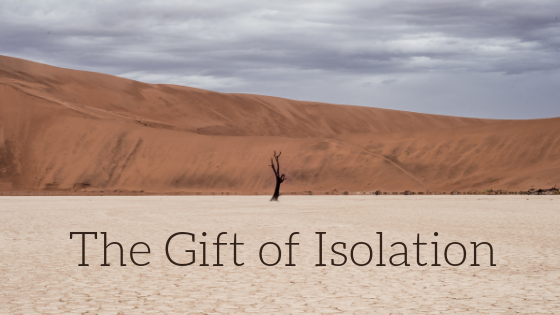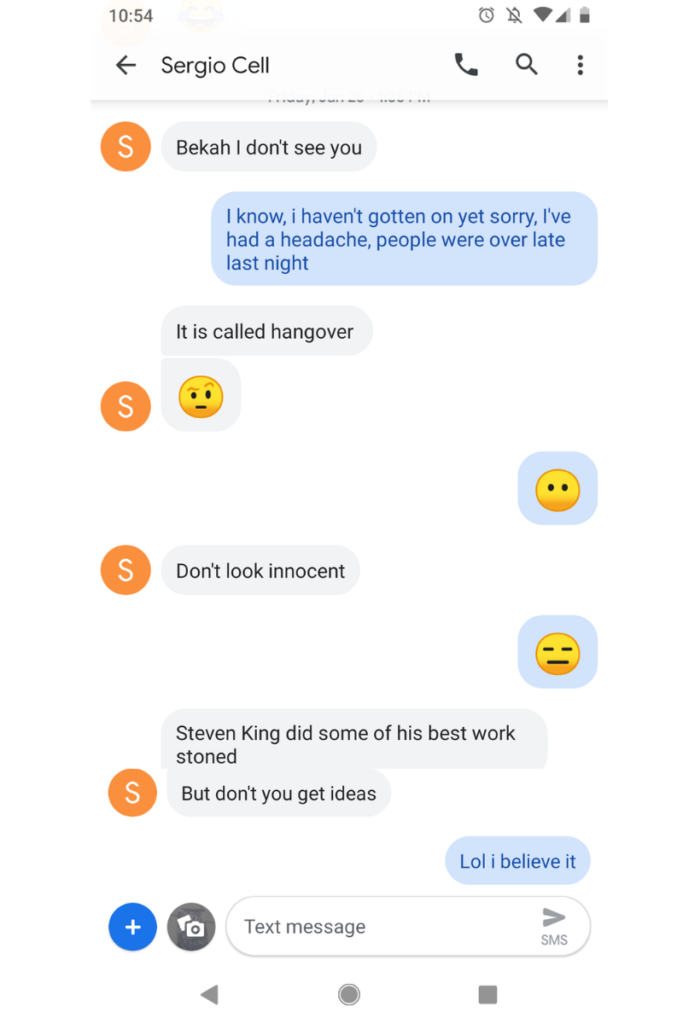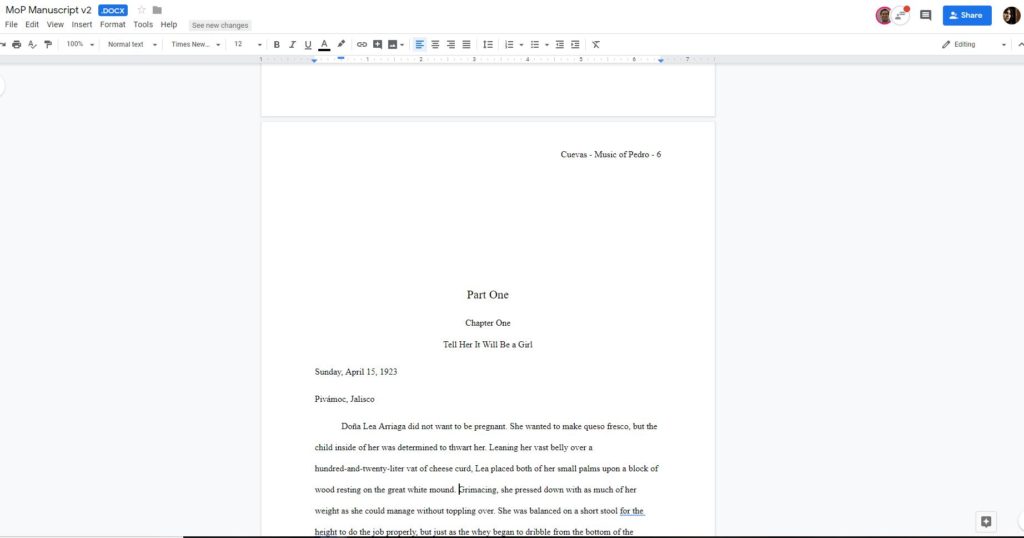
The Gift of Isolation (or How I Wrote 200k Words in 3 Years)
Years ago, Long-Term Fiance (LT) and I went to a house party and met a man who enthralled us. A spellbinding poet, brilliant tech professional, video game designer, and queer activist, he seemed a miraculous manifestation of the person LT and I would be if the best versions of ourselves—the people we aspired to be—were spliced into one.
When we left Utah to follow a career opportunity for LT, Spliced Manifestation (SM) came to our going-away party. Amid the well-earned congratulations for my fiance, SM sat with me on the grass to say how excited he was for me. I was about to move hundreds of miles from friends and family toward a prospect only certain career paths can appreciation: isolation.
We had been published in the same journal (peculiar), gone to open mic readings together, commiserated; we understood each other on a tribal level. We hugged.
“You’re going to get so much writing done,” he said.
His prediction aligned with my intention. I resolved to prove him right.
What Happened Next
I took my freelance clients with me after the move, including my dad. I’d rewritten up to chapter nineteen of his novel by the time I left the state—approximately 40,000 words in fourteen months. But over the next thirteen months in isolation I wrote about 155,000 words to complete the first draft of the rewrite (85 chapters).
After receiving beta reader feedback and applying even more edits, we arrived at a 203,000-word manuscript on July 24, 2019, when I finished writing the epilogue. [For reference, your standard debut novel length, if you’re going the traditional publishing route, would put you at about 80k-100k (or 300 to 400 pages).]
We wrote a beast of a book but based on the speed with which our most enthusiastic beta readers finished it and their responses, we’re pushing forward instead of cutting back. We’re self-publishing digitally except for a special print edition we’re planning to do for the book launch, and it will be hefty.
Math IRL (The Verdict):
Pre-move monthly word count:
~2,800 wds/month or 233 words a day*
Post-move monthly word count:
~11,900 wds/month or 991 words a day**
* I estimate having worked on the book an average of three solid days a week in between work for other freelance clients, and I rarely ever work on anything but personal projects on the weekends, so I divided the monthly word count by 12 days.
** Neil Gaiman apparently can do 6,000 words per day for “short bursts of total madness,” but says 1,000/day is a solid goal.
How’d I Do It?
- Isolation
- My 2018 New Year’s resolution actually paid off.
- My dad called me almost every day for updates.
- I picked a couple o’ besties who love cancelled plans as much as I do.
- I channelled Mary Oliver.
Isolation
Give me the Internet, snacks, and a clackety keyboard and I’ll be happy alone indefinitely. That’s generally been the case since my personality took shape and my new town has gifted me troves of opportunity to indulge.
It holds about 30k people (about the size of Spanish Fork for you Utahans) with the nearest metropolitan area almost a two-hour drive away. At the height of summer it’s too hot to exist out of doors, but when the temp permits there’s enough to do in town if you’re not too spoiled by big-city options and inclined to leave the house, which I rarely am. We stop hiking when it heats up enough to wake the snakes, and if I don’t make it out for my morning run by 7:30, the sun shouts me back inside.
Turnover at LT’s place of work—which is the main reason anyone lives here at all—is traditionally high. The partners of its employees generally don’t want to plant roots in so barren a landscape, or the romantic options are too sparse for those who arrive single. But I’m comfortable. More than. I love living here. As I’ll tell anyone who asks, my favorite thing about it is the isolation.
New Year’s Resolution
I started off 2018 with the goal to write at least six chapters a month. I kept a physical planner and made a strict checklist, plotted out my weekly schedules and by the end of October, I’d finished off the final chapter after a three-day writing sprint in which I still only managed 3,000 words a day. (What even is Neil Gaiman anyway?)

Daily Wake Up Call
If it wasn’t a text it was a phone call. And if it was neither, it was an email. Are you working on it yet? Tell me when you start. I see you online, where are you? I don’t see you online, where are you? My dad was a benevolent taskmaster; some days it was easy to forget he was also my client.

Also Don’t work on my book on Sundays, he said. Why? Because even the slaves and beasts got a day of rest in the Bible.
I generally try to keep a fire going under my office chair, but in the writing of Music of Pedro, my dad fed it a forest of logs. I’d log on to Google Docs and often he’d already be “active.”
Hi Bek
Hey pops
How much have you written?
I’d write in Word, pasting new content as I went so he could review, answer my questions, fill in gaps of research, discuss plot pace and character development, always his cute smiling icon at the top of the screen.

Hanging With Friends
Last year one of LT’s colleagues asked him if I’d be interested in going to a social she was organizing for the wives of other new hires—other women uprooted from their social circles elsewhere and contending with our new town’s characteristic isolation.
Before I share how LT responded on my behalf, I want to insist that I’m sure it would have been a positive and uplifting experience had I gone. I do love a good and juicy heart-to-heart with a new friend, and maybe there’d been a few bosom-buddy potentials at the mixer, but after how he chose to phrase his response, it was just easier to let the opportunity slide: “Oh, she doesn’t want new friends. She says two is enough.”
In the past, I’d made comments to him about how I felt it was important that I protect the aspect of our new situation that I loved so much: the isolation. I had to consider my time precious if I wanted to meet the goals I’d set for myself. After clicking with two amazing women here who I regularly wanted to spend time with, I said, “I think that’s gotta be my limit, LT. I got shit to do.” But I didn’t imagine he’d go around saying as much to friendlies!
The fact remains, however, that I didn’t salvage the botched first impression and go to the social. I ultimately appreciated the “out” he’d given me and I went on to meet my goals.
Advice from Mary Oliver
In Upstream, Mary Oliver writes: “One must work with the creative powers—for not to work with is to work against; in art as in spiritual life there is no neutral place. Especially at the beginning there is a need of discipline as well as solitude and concentration. A writing schedule is a good suggestion to make to young writers, for example” (pg. 28).
Show up for yourself. Be strict. Honor your time and your creative impulse. “Would one tell [young writers] so soon the whole truth,” Oliver continues, “that one must be ready at all hours, and always, that the ideas in their shimmering forms, in spite of all our conscious discipline, will come when they will, and on the swift upheaval of their wings—disorderly; reckless; as unmanageable, sometimes, as passion?” (pg. 28).
The further removed I am from my passions, the deeper my mental ruts. I’m more prone to anxiety and depression when I’m not writing. I’m irritable, I sink where I stand. I like to think I have this in common with Neil Gaiman and Mary Oliver, with Spliced Manifestation and other kindred creators—the restive compulsion to produce.
Estrangement from writing is as destabilizing to my trajectory as the periods of time I’d lost connection with family and with other women, my tribes. I found myself again when I made my post-prodigal return, and the by-products I’ve gained have been LT, Kylo, and now this book.
“You’re going to get so much writing done,” promised SM.
There’s still so much work to do, but for now—today—I’m going to breathe deep before the plunge into typesetting and feel proud that I proved him right.



